初中英语情态动词讲解-练习及答案
初中英语语法之情态动词用法及练习题(含答案)
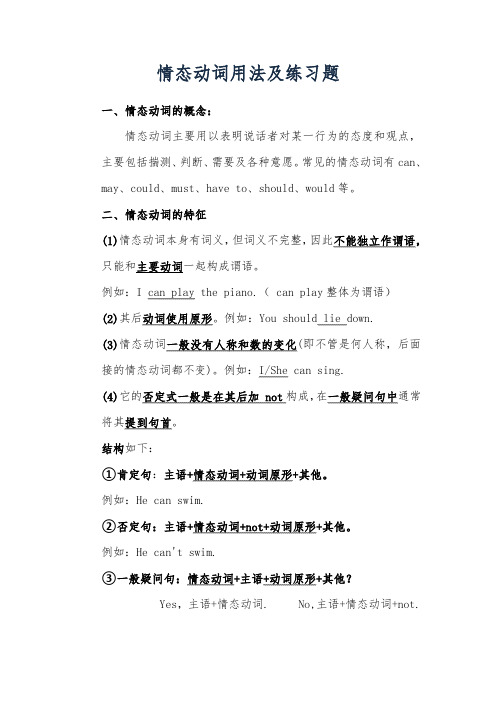
情态动词用法及练习题一、情态动词的概念:情态动词主要用以表明说话者对某一行为的态度和观点,主要包括揣测、判断、需要及各种意愿。
常见的情态动词有can、may、could、must、have to、should、would等。
二、情态动词的特征(1)情态动词本身有词义,但词义不完整,因此不能独立作谓语,只能和主要动词一起构成谓语。
例如:I can play the piano.( can play整体为谓语)(2)其后动词使用原形。
例如:You should lie down.(3)情态动词一般没有人称和数的变化(即不管是何人称,后面接的情态动词都不变)。
例如:I/She can sing.(4)它的否定式一般是在其后加 not构成,在一般疑问句中通常将其提到句首。
结构如下:①肯定句:主语+情态动词+动词原形+其他。
例如:He can swim.②否定句:主语+情态动词+not+动词原形+其他。
例如:He can't swim.③一般疑问句:情态动词+主语+动词原形+其他?Yes,主语+情态动词. No,主语+情态动词+not.例如:-Can he swim?-Yes, he can. No,he can’t.④特殊疑问句:特殊疑问词+情态动词+主语+动词原形+其他? 例如: -What can he do ?-He can swim.三.情态动词的用法(1)can的用法①表示“能力”Can you sing?你会唱歌吗?②表示客观条件允许You can listen to music here.你可以在这里听音乐。
You can’t park your car here. 你不能在此停车③can用在否定句和疑问句中时,有时表示说话人的怀疑、惊异、或猜测:It can’t be true.这不可能是事实Can it be true?这可能是真的吗?④.can的搭配用法:A.as +adj./adv.+as one can/could “尽可能,尽量……”,如:The man took his child to the hospital as quickly as he could.这个男人尽可能快地将孩子送去医院。
初中英语情态动词专项练习(附答案解析)
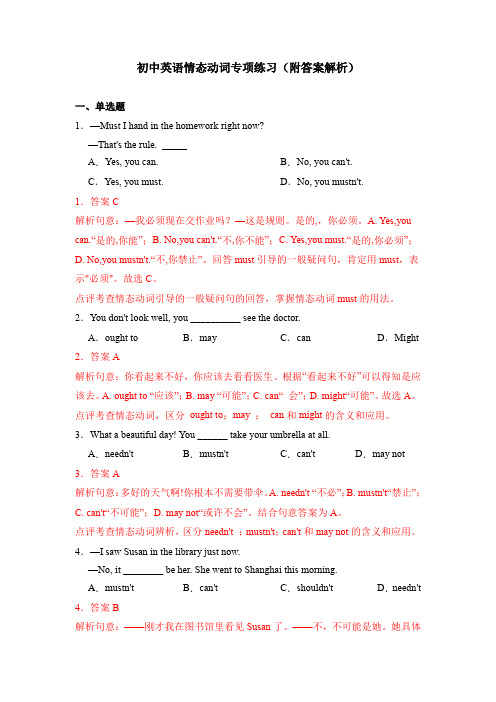
初中英语情态动词专项练习(附答案解析)一、单选题1.—Must I hand in the homework right now?—That's the rule.A.Yes, you can.B.No, you can't.C.Yes, you must.D.No, you mustn't.1.答案C解析句意:—我必须现在交作业吗?—这是规则。
是的,,你必须。
A. Yes,you can.“是的,你能”;B. No,you can't.“不,你不能”;C. Yes,you must.“是的,你必须”;D. No,you mustn't.“不,你禁止”。
回答must引导的一般疑问句,肯定用must,表示"必须"。
故选C。
点评考查情态动词引导的一般疑问句的回答,掌握情态动词must的用法。
2.You don't look well, you __________ see the doctor.A.ought to B.may C.can D.Might 2.答案A解析句意:你看起来不好,你应该去看看医生。
根据“看起来不好”可以得知是应该去。
A. ought to “应该”;B. may “可能”;C. can“ 会”;D. might“可能”。
故选A。
点评考查情态动词,区分ought to;may ;can和might的含义和应用。
3.What a beautiful day! You ______ take your umbrella at all.A.needn't B.mustn't C.can't D.may not 3.答案A解析句意:多好的天气啊!你根本不需要带伞。
A. needn't “不必”;B. mustn't“禁止”;C. can't“不可能”;D. may not“或许不会”。
初中英语情态动词训练附答案
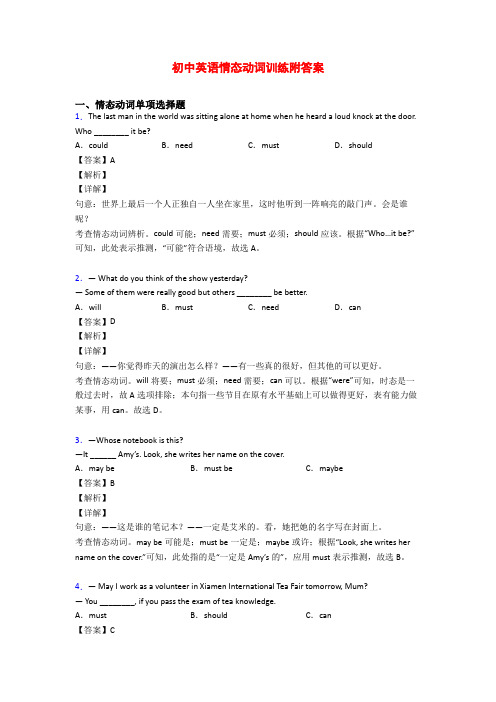
初中英语情态动词训练附答案一、情态动词单项选择题1.The last man in the world was sitting alone at home when he heard a loud knock at the door. Who ________ it be?A.could B.need C.must D.should【答案】A【解析】【详解】句意:世界上最后一个人正独自一人坐在家里,这时他听到一阵响亮的敲门声。
会是谁呢?考查情态动词辨析。
could可能;need需要;must必须;should应该。
根据“Who…it be?”可知,此处表示推测,“可能”符合语境,故选A。
2.— What do you think of the show yesterday?— Some of them were really good but others ________ be better.A.will B.must C.need D.can【答案】D【解析】【详解】句意:——你觉得昨天的演出怎么样?——有一些真的很好,但其他的可以更好。
考查情态动词。
will将要;must必须;need需要;can可以。
根据“were”可知,时态是一般过去时,故A选项排除;本句指一些节目在原有水平基础上可以做得更好,表有能力做某事,用can。
故选D。
3.—Whose notebook is this?—It ______ Amy’s. Look, she writes her name on the cover.A.may be B.must be C.maybe【答案】B【解析】【详解】句意:——这是谁的笔记本?——一定是艾米的。
看,她把她的名字写在封面上。
考查情态动词。
may be可能是;must be一定是;maybe或许;根据“Look, she writes her name on the cover.”可知,此处指的是“一定是Amy’s的”,应用must表示推测,故选B。
全面解析初中英语情态动词100例与答案
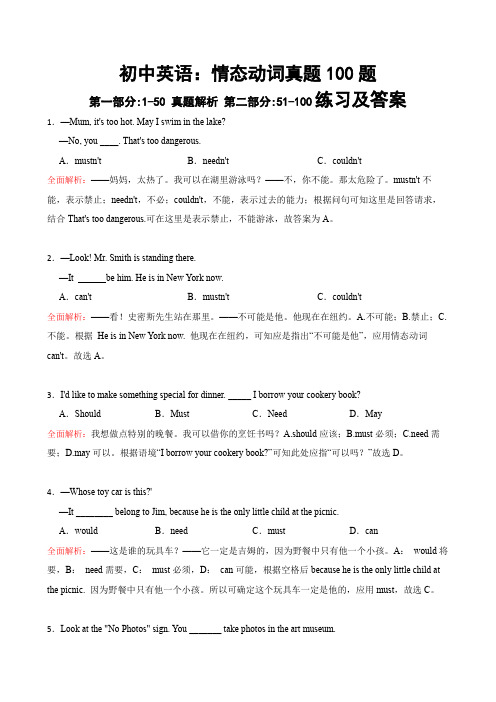
初中英语:情态动词真题100题第一部分:1-50 真题解析第二部分:51-100练习及答案1.—Mum, it's too hot. May I swim in the lake?—No, you ____. That's too dangerous.A.mustn't B.needn't C.couldn't全面解析:——妈妈,太热了。
我可以在湖里游泳吗?——不,你不能。
那太危险了。
mustn't不能,表示禁止;needn't,不必;couldn't,不能,表示过去的能力;根据问句可知这里是回答请求,结合That's too dangerous.可在这里是表示禁止,不能游泳,故答案为A。
2.—Look! Mr. Smith is standing there.—It be him. He is in New York now.A.can't B.mustn't C.couldn't全面解析:——看!史密斯先生站在那里。
——不可能是他。
他现在在纽约。
A.不可能;B.禁止;C.不能。
根据He is in New York now. 他现在在纽约,可知应是指出“不可能是他”,应用情态动词can't。
故选A。
3.I'd like to make something special for dinner. _____ I borrow your cookery book?A.Should B.Must C.Need D.May全面解析:我想做点特别的晚餐。
我可以借你的烹饪书吗?A.should应该;B.must必须;C.need需要;D.may可以。
根据语境“I borrow your cookery book?”可知此处应指“可以吗?”故选D。
4.—Whose toy car is this?'—It ________ belong to Jim, because he is the only little child at the picnic.A.would B.need C.must D.can全面解析:——这是谁的玩具车?——它一定是吉姆的,因为野餐中只有他一个小孩。
初中英语情态动词训练附答案
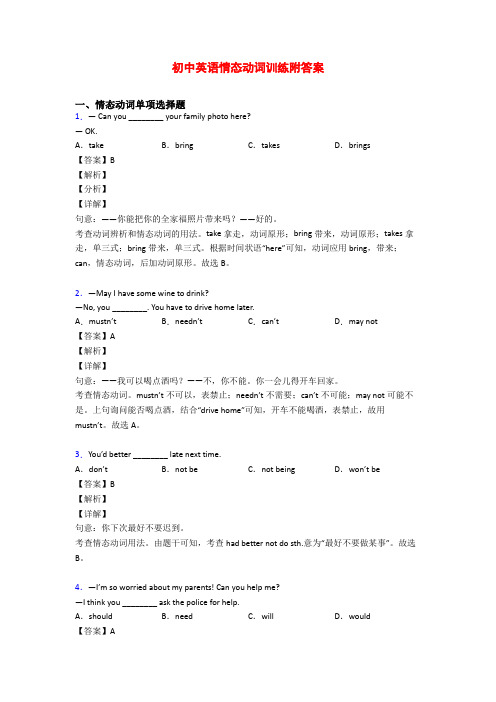
初中英语情态动词训练附答案一、情态动词单项选择题1.— Can you ________ your family photo here?— OK.A.take B.bring C.takes D.brings【答案】B【解析】【分析】【详解】句意:——你能把你的全家福照片带来吗?——好的。
考查动词辨析和情态动词的用法。
take拿走,动词原形;bring带来,动词原形;takes拿走,单三式;bring带来,单三式。
根据时间状语“here”可知,动词应用bring,带来;can,情态动词,后加动词原形。
故选B。
2.—May I have some wine to drink?—No, you ________. You have to drive home later.A.mustn’t B.needn’t C.can’t D.may not【答案】A【解析】【详解】句意:——我可以喝点酒吗?——不,你不能。
你一会儿得开车回家。
考查情态动词。
mustn’t不可以,表禁止;needn’t不需要;can’t不可能;may not可能不是。
上句询问能否喝点酒,结合“drive home”可知,开车不能喝酒,表禁止,故用mustn’t。
故选A。
3.You’d better ________ late next time.A.don’t B.not be C.not being D.won’t be【答案】B【解析】【详解】句意:你下次最好不要迟到。
考查情态动词用法。
由题干可知,考查had better not do sth.意为“最好不要做某事”。
故选B。
4.—I’m so worried about my parents! Can you help m e?—I think you ________ ask the police for help.A.should B.need C.will D.would【答案】A【详解】句意:——我很担心我的父母!你能帮我吗?——我认为你应该向警察寻求帮助。
初一英语情态动词试题答案及解析
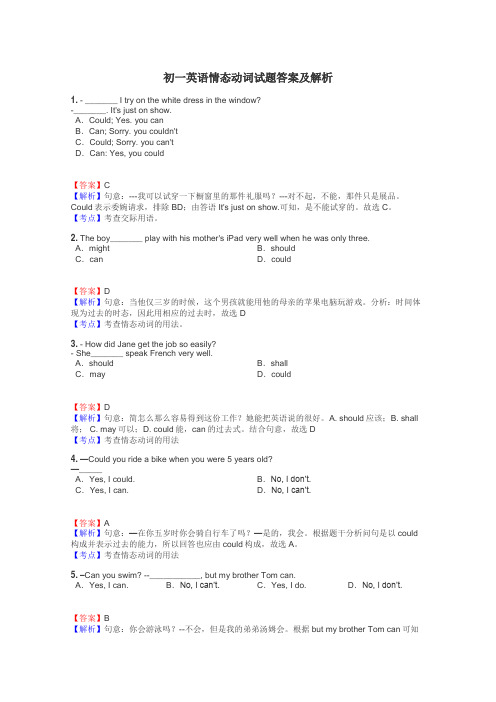
初一英语情态动词试题答案及解析1. - _______ I try on the white dress in the window?-_______. It's just on show.A.Could; Yes. you canB.Can; Sorry. you couldn'tC.Could; Sorry. you can'tD.Can: Yes, you could【答案】C【解析】句意:---我可以试穿一下橱窗里的那件礼服吗?---对不起,不能,那件只是展品。
Could表示委婉请求,排除BD;由答语It's just on show.可知,是不能试穿的。
故选C。
【考点】考查交际用语。
2. The boy_______ play with his mother's iPad very well when he was only three.A.might B.shouldC.can D.could【答案】D【解析】句意:当他仅三岁的时候,这个男孩就能用他的母亲的苹果电脑玩游戏。
分析:时间体现为过去的时态,因此用相应的过去时,故选 D【考点】考查情态动词的用法。
3. - How did Jane get the job so easily?- She_______ speak French very well.A.should B.shallC.may D.could【答案】D【解析】句意:简怎么那么容易得到这份工作?她能把英语说的很好。
A. should应该;B. shall 将; C. may可以;D. could能,can的过去式。
结合句意,故选D【考点】考查情态动词的用法4.—Could you ride a bike when you were 5 years old?—_____A.Yes, I could.B.No, I don’t.C.Yes, I can.D.No, I can’t.【答案】A【解析】句意:—在你五岁时你会骑自行车了吗?—是的,我会。
【英语】 情态动词练习题(含答案)
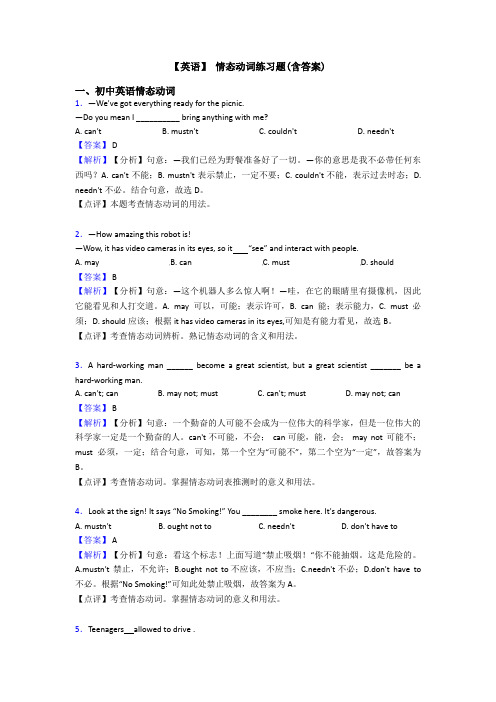
【英语】情态动词练习题(含答案)一、初中英语情态动词1.—We've got everything ready for the picnic.—Do you mean I __________ bring anything with me?A. can'tB. mustn'tC. couldn'tD. needn't【答案】 D【解析】【分析】句意:—我们已经为野餐准备好了一切。
—你的意思是我不必带任何东西吗?A. can't 不能;B. mustn't 表示禁止,一定不要;C. couldn't不能,表示过去时态;D. needn't不必。
结合句意,故选D。
【点评】本题考查情态动词的用法。
2.—How amazing this robot is!—Wow, it has video cameras in its eyes, so it “see” and interact with people.A. mayB. canC. mustD. should【答案】 B【解析】【分析】句意:—这个机器人多么惊人啊!—哇,在它的眼睛里有摄像机,因此它能看见和人打交道。
A. may 可以,可能;表示许可,B. can 能;表示能力,C. must 必须;D. should应该;根据it has video cameras in its eyes,可知是有能力看见,故选B。
【点评】考查情态动词辨析。
熟记情态动词的含义和用法。
3.A hard-working man ______ become a great scientist, but a great scientist _______ be a hard-working man.A. can't; canB. may not; mustC. can't; mustD. may not; can【答案】 B【解析】【分析】句意:一个勤奋的人可能不会成为一位伟大的科学家,但是一位伟大的科学家一定是一个勤奋的人。
情态动词练习题(含答案)1
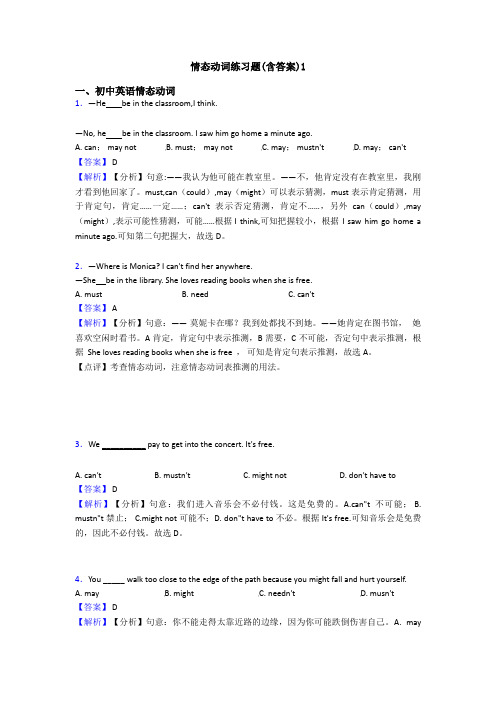
情态动词练习题(含答案)1一、初中英语情态动词1.—He be in the classroom,I think.—No, he be in the classroom. I saw him go home a minute ago.A. can; may notB. must; may notC. may; mustn'tD. may; can't【答案】 D【解析】【分析】句意:——我认为他可能在教室里。
——不,他肯定没有在教室里,我刚才看到他回家了。
must,can(could),may(might)可以表示猜测,must表示肯定猜测,用于肯定句,肯定……一定……;can't表示否定猜测,肯定不……,另外can(could),may (might),表示可能性猜测,可能……根据I think,可知把握较小,根据I saw him go home a minute ago.可知第二句把握大,故选D。
2.—Where is Monica? I can't find her anywhere.—She be in the library. She loves reading books when she is free.A. mustB. needC. can't【答案】 A【解析】【分析】句意:——莫妮卡在哪?我到处都找不到她。
——她肯定在图书馆,她喜欢空闲时看书。
A肯定,肯定句中表示推测,B需要,C不可能,否定句中表示推测,根据 She loves reading books when she is free ,可知是肯定句表示推测,故选A。
【点评】考查情态动词,注意情态动词表推测的用法。
3.We __________ pay to get into the concert. It's free.A. can'tB. mustn'tC. might notD. don't have to【答案】 D【解析】【分析】句意:我们进入音乐会不必付钱。
人教版中考英语专项训练情态动词专题(含答案)
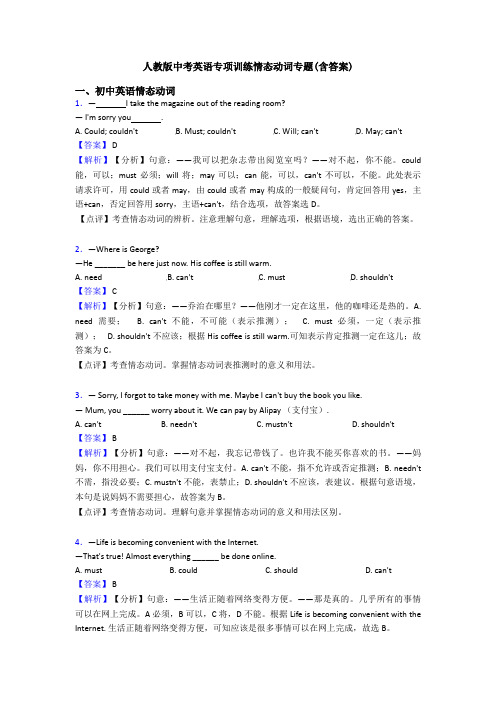
人教版中考英语专项训练情态动词专题(含答案)一、初中英语情态动词1.— I take the magazine out of the reading room?— I'm sorry you .A. Could; couldn'tB. Must; couldn'tC. Will; can'tD. May; can't【答案】 D【解析】【分析】句意:——我可以把杂志带出阅览室吗?——对不起,你不能。
could 能,可以;must必须;will将;may可以;can能,可以,can't不可以,不能。
此处表示请求许可,用could或者may,由could或者may构成的一般疑问句,肯定回答用yes,主语+can,否定回答用sorry,主语+can't,结合选项,故答案选D。
【点评】考查情态动词的辨析。
注意理解句意,理解选项,根据语境,选出正确的答案。
2.—Where is George?—He _______ be here just now. His coffee is still warm.A. needB. can'tC. mustD. shouldn't【答案】 C【解析】【分析】句意:——乔治在哪里?——他刚才一定在这里,他的咖啡还是热的。
A. need需要; B. can't 不能,不可能(表示推测); C. must 必须,一定(表示推测); D. shouldn't不应该;根据His coffee is still warm.可知表示肯定推测一定在这儿;故答案为C。
【点评】考查情态动词。
掌握情态动词表推测时的意义和用法。
3.— Sorry, I forgot to take money with me. Maybe I can't buy the book you like.— Mum, you ______ worry about it. We can pay by Alipay (支付宝).A. can'tB. needn'tC. mustn'tD. shouldn't【答案】 B【解析】【分析】句意:——对不起,我忘记带钱了。
情态动词专项练习题及答案
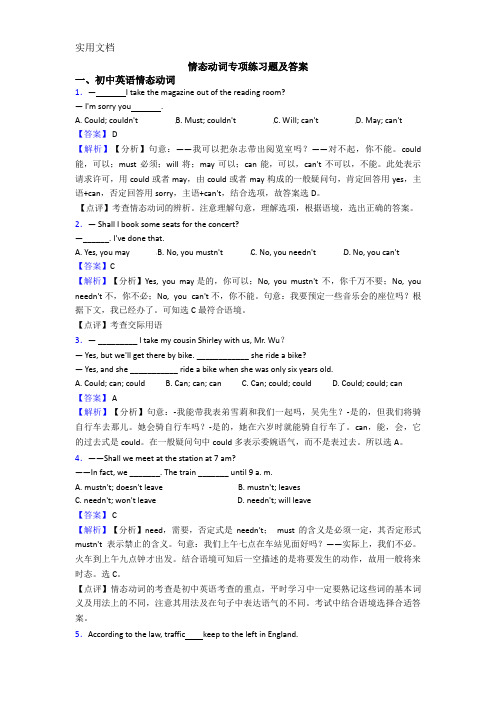
情态动词专项练习题及答案一、初中英语情态动词1.— I take the magazine out of the reading room?— I'm sorry you .A. Could; couldn'tB. Must; couldn'tC. Will; can'tD. May; can't【答案】 D【解析】【分析】句意:——我可以把杂志带出阅览室吗?——对不起,你不能。
could 能,可以;must必须;will将;may可以;can能,可以,can't不可以,不能。
此处表示请求许可,用could或者may,由could或者may构成的一般疑问句,肯定回答用yes,主语+can,否定回答用sorry,主语+can't,结合选项,故答案选D。
【点评】考查情态动词的辨析。
注意理解句意,理解选项,根据语境,选出正确的答案。
2.— Shall I book some seats for the concert?—______. I've done that.A. Yes, you mayB. No, you mustn'tC. No, you needn'tD. No, you can't【答案】C【解析】【分析】Yes, you may是的,你可以;No, you mustn't 不,你千万不要;No, you needn't不,你不必;No, you can't不,你不能。
句意:我要预定一些音乐会的座位吗?根据下文,我已经办了。
可知选C最符合语境。
【点评】考查交际用语3.— _________ I take my cousin Shirley with us, Mr. Wu?— Yes, but we'll get there by bike. ____________ she ride a bike?— Yes, and she ___________ ride a bike when she was only six years old.A. Could; can; couldB. Can; can; canC. Can; could; couldD. Could; could; can【答案】 A【解析】【分析】句意:-我能带我表弟雪莉和我们一起吗,吴先生?-是的,但我们将骑自行车去那儿。
初中英语情态动词训练附答案

初中英语情态动词训练附答案一、情态动词单项选择题1.—David, you ________ wear sunglasses when you hike.—OK dad. Thanks.A.should B.shall C.might D.would【答案】A【解析】【详解】句意:——大卫,你徒步旅行时应该戴墨镜。
——好的,爸爸。
谢谢。
考查情态动词。
should应该;shall将、要;might可能;would将,will的过去式;根据“ when you hike”提示可知此处指“徒步旅行时应该戴墨镜”;故选A。
2.—Could you tell me how to renew the library books?—With pleasure. You ________ come to our desk every time. It’s easier to renew them online. A.can’t B.mustn’t C.needn’t D.shouldn’t【答案】C【解析】【详解】句意:——你能告诉我怎样续借图书馆的书吗?——非常乐意。
你不必每次都来我们前台。
在网上续借更容易。
考查情态动词辨析。
can’t不可能;mustn’t禁止;needn’t不必;shouldn’t不应该。
根据“It’s easier to renew them online”可知,在网上就能完成续借的事情,不必来前台办理,故选C。
3.Before you turn off the computer, you must ________ the document.A.save B.open C.click【答案】A【解析】【详解】句意:在你关闭电脑之前,你必须保存文件。
考查动词辨析。
save保存;open打开;click点击;根据“Before you turn off the computer, you must…he document.”及常识可知,关电脑之前先保存文件。
初中英语情态动词详细用法归纳(含练习及答案)
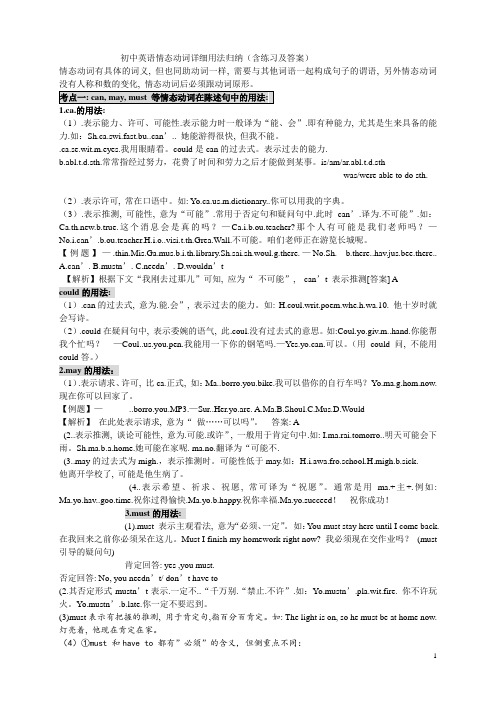
初中英语情态动词详细用法归纳(含练习及答案)情态动词有具体的词义, 但也同助动词一样, 需要与其他词语一起构成句子的谓语, 另外情态动词没有人称和数的变化, 情态动词后必须跟动词原形。
1.ca.的用法:(1).表示能力、许可、可能性.表示能力时一般译为“能、会”.即有种能力, 尤其是生来具备的能力.如:Sh.ca.swi.fast.bu..can’.. 她能游得很快, 但我不能。
.ca.se.wit.m.eyes.我用眼睛看。
could是can的过去式。
表示过去的能力.b.abl.t.d.sth.常常指经过努力,花费了时间和劳力之后才能做到某事。
is/am/ar.abl.t.d.sthwas/were able to do sth.(2).表示许可, 常在口语中。
如: .m.dictionary..你可以用我的字典。
(3).表示推测, 可能性, 意为“可能”.常用于否定句和疑问句中.此时can’.译为.不可能”.如:Ca.th.new.b.true.这个消息会是真的吗?—Ca.i.b.ou.teacher?那个人有可能是我们老师吗?—No.i.can’.b.ou.teacher.H.i.o..visi.t.th.Grea.Wall.不可能。
咱们老师正在游览长城呢。
【例题】—.thin.Mis.Ga.mus.b.i.th.library.Sh.sai.sh.woul.g.there.—No.Sh.__b.there..hav.jus.bee.there..A.can’.B.mustn’.C.needn’.D.wouldn’t【解析】根据下文“我刚去过那儿”可知, 应为“不可能”, can’t 表示推测[答案] Acould的用法:(1).can的过去式, 意为.能.会”, 表示过去的能力。
如: H.coul.writ.poem.whe.h.wa.10. 他十岁时就会写诗。
(2).could在疑问句中, 表示委婉的语气, 此.coul.没有过去式的意思。
情态动词专项练习(附答案)
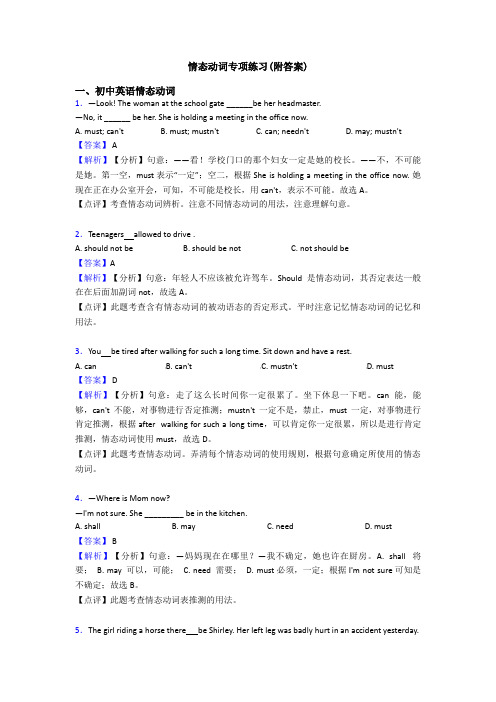
情态动词专项练习(附答案)一、初中英语情态动词1.—Look! The woman at the school gate ______be her headmaster.—No, it ______ be her. She is holding a meeting in the office now.A. must; can'tB. must; mustn'tC. can; needn'tD. may; mustn't【答案】 A【解析】【分析】句意:——看!学校门口的那个妇女一定是她的校长。
——不,不可能是她。
第一空,must表示“一定”;空二,根据She is holding a meeting in the office now. 她现在正在办公室开会,可知,不可能是校长,用can't,表示不可能。
故选A。
【点评】考查情态动词辨析。
注意不同情态动词的用法,注意理解句意。
2.Teenagers allowed to drive .A. should not beB. should be notC. not should be【答案】A【解析】【分析】句意:年轻人不应该被允许驾车。
Should是情态动词,其否定表达一般在在后面加副词not,故选A。
【点评】此题考查含有情态动词的被动语态的否定形式。
平时注意记忆情态动词的记忆和用法。
3.You be tired after walking for such a long time. Sit down and have a rest.A. canB. can'tC. mustn'tD. must【答案】 D【解析】【分析】句意:走了这么长时间你一定很累了。
坐下休息一下吧。
can能,能够,can't不能,对事物进行否定推测;mustn't一定不是,禁止,must一定,对事物进行肯定推测,根据after walking for such a long time,可以肯定你一定很累,所以是进行肯定推测,情态动词使用must,故选D。
初中英语情态动词训练附答案
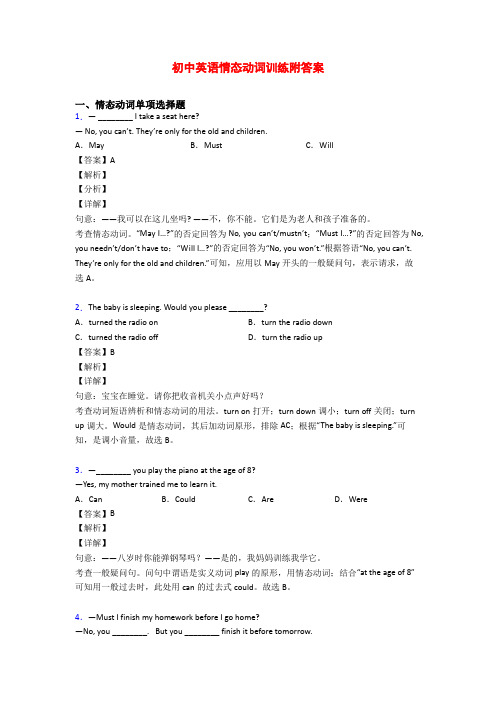
初中英语情态动词训练附答案一、情态动词单项选择题1.— ________ I take a seat here?—No, you can’t. They’re only for the old and children.A.May B.Must C.Will【答案】A【解析】【分析】【详解】句意:——我可以在这儿坐吗? ——不,你不能。
它们是为老人和孩子准备的。
考查情态动词。
“May I…?”的否定回答为No, you can’t/mustn’t;“Must I…?”的否定回答为No, you needn’t/don’t have to;“Will I…?”的否定回答为“No, you won’t.”根据答语“No, you can’t. They’re only for the old and children.”可知,应用以May开头的一般疑问句,表示请求,故选A。
2.The baby is sleeping. Would you please ________?A.turned the radio on B.turn the radio downC.turned the radio off D.turn the radio up【答案】B【解析】【详解】句意:宝宝在睡觉。
请你把收音机关小点声好吗?考查动词短语辨析和情态动词的用法。
turn on打开;turn down调小;turn off关闭;turn up调大。
Would是情态动词,其后加动词原形,排除AC;根据“The baby is sleeping.”可知,是调小音量,故选B。
3.—________ you play the piano at the age of 8?—Yes, my mother trained me to learn it.A.Can B.Could C.Are D.Were【答案】B【解析】【详解】句意:——八岁时你能弹钢琴吗?——是的,我妈妈训练我学它。
初中英语情态动词训练附答案

初中英语情态动词训练附答案一、情态动词单项选择题1.You’d better ________ at home all day. Going out and keeping ________ can help you live more healthily.A.not stay; to exercise B.not to stay; to exerciseC.not stay; exercising D.not to stay; exercising【答案】C【解析】【分析】【详解】句意:你最好不要整天呆在家里。
走出去,坚持锻炼可以帮助你生活得更健康。
考查固定搭配。
根据“had better do sth.”和下句句意可知,最好不要整天呆在家里,因此第一空not stay符合句意;再者根据固定搭配“keep doing sth.”可知,此空需要动名词形式,因此第二空exercising符合句意。
故选C。
2.The woman who is talking with Mr. Li ________ be Miss Wang. She has gone to Britain. A.ca n’t B.must C.may D.mustn’t【答案】A【解析】【分析】【详解】句意:正在和李先生说话的那个女人不可能是王小姐。
她去了英国。
考查情态动词。
can’t不可能;must一定;may可能;must’t禁止。
根据“She has gone to Britain”可知,她已经去了英国,因此有把握推测她不可能是王小姐,故选A。
3.John ________ be in the office. I saw him in the street just now.A.can B.must C.can’t D.should【答案】C【解析】【详解】句意:约翰不可能在办公室。
我刚才在街上看见他了。
考查情态动词。
can能;must必须;can’t不可能;should应该;根据“I saw him in the street just now.”可知,他不可能在办公室,此处是否定的推测,应用can’t表示,故选C。
初二英语情态动词试题答案及解析
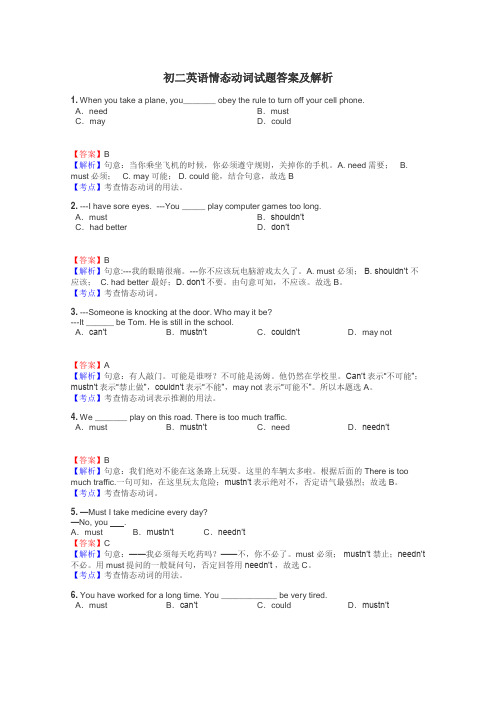
初二英语情态动词试题答案及解析1. When you take a plane, you_______ obey the rule to turn off your cell phone.A.need B.mustC.may D.could【答案】B【解析】句意:当你乘坐飞机的时候,你必须遵守规则,关掉你的手机。
A. need需要; B. must必须; C. may 可能; D. could能,结合句意,故选B【考点】考查情态动词的用法。
2. ---I have sore eyes. ---You _____ play computer games too long.A.must B.shouldn’tC.had better D.don’t【答案】B【解析】句意:---我的眼睛很痛。
---你不应该玩电脑游戏太久了。
A. must 必须;B. shouldn’t 不应该; C. had better 最好;D. don’t不要。
由句意可知,不应该。
故选B。
【考点】考查情态动词。
3. ---Someone is knocking at the door. Who may it be?---It ______ be Tom. He is still in the school.A.can’t B.mustn’t C.couldn’t D.may not【答案】A【解析】句意:有人敲门。
可能是谁呀?不可能是汤姆。
他仍然在学校里。
Can’t表示“不可能”;mustn’t表示“禁止做”,couldn’t表示“不能”,may not表示“可能不”。
所以本题选A。
【考点】考查情态动词表示推测的用法。
4. We _______ play on this road. There is too much traffic.A.must B.mustn’t C.need D.needn’t【答案】B【解析】句意:我们绝对不能在这条路上玩耍。
初一英语情态动词试题答案及解析

初一英语情态动词试题答案及解析1. You afraid of doing homework. You know, it’s easy. Just be careful.A.don’t have to B.have to beC.don’t have D.don’t have to be【答案】D【解析】根据下文,你知道,这很简单。
只要小心就行了。
可知前文指的是,你不必害怕做作业。
故选D。
【考点】考查动词的用法2. The boy_______ play with his mother's iPad very well when he was only three.A.might B.shouldC.can D.could【答案】D【解析】句意:当他仅三岁的时候,这个男孩就能用他的母亲的苹果电脑玩游戏。
分析:时间体现为过去的时态,因此用相应的过去时,故选 D【考点】考查情态动词的用法。
3. -_______ I borrow your camera? I want to take some photos.-Sure, here you are.A.Must B.NeedC.May D.Should【答案】C【解析】句意:我可以借用你的照相机吗?我想拍几张照片。
---当然可以,给你。
A. Must必须;B. Need 需要;C. May可以;D. Should应该。
征求对方许可用may。
故选C。
【考点】考查情态动词。
4. - How did Jane get the job so easily?- She_______ speak French very well.A.should B.shallC.may D.could【答案】D【解析】句意:--简怎么那么容易地得到那份工作?—她的法语讲得很好。
A. should 应该; B. shall 将; C. may也许; D. could会,能够。
初中英语情态动词训练附答案
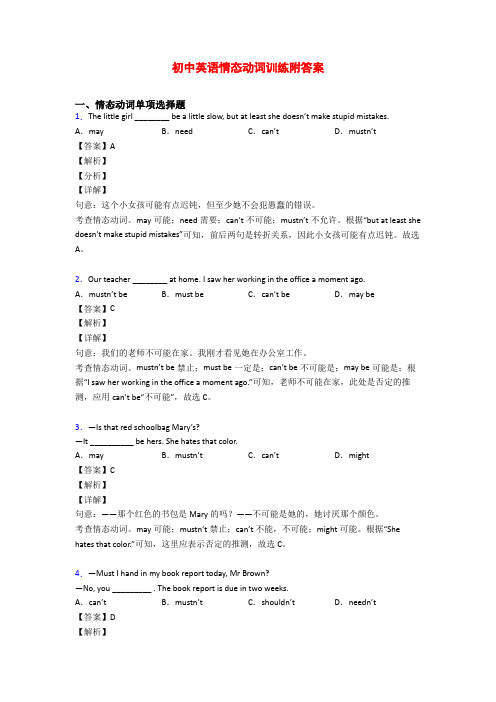
初中英语情态动词训练附答案一、情态动词单项选择题1.The little girl ________ be a little slow, but at least she doesn’t make stupid mistakes. A.may B.need C.can’t D.mustn’t【答案】A【解析】【分析】【详解】句意:这个小女孩可能有点迟钝,但至少她不会犯愚蠢的错误。
考查情态动词。
may可能;need需要;can’t不可能;mustn’t不允许。
根据“but at least she doesn’t make stupid mistakes”可知,前后两句是转折关系,因此小女孩可能有点迟钝。
故选A。
2.Our teacher ________ at home. I saw her working in the office a moment ago.A.mustn’t be B.must be C.can’t be D.may be【答案】C【解析】【详解】句意:我们的老师不可能在家。
我刚才看见她在办公室工作。
考查情态动词。
mustn’t be禁止;must be一定是;can’t be不可能是;may be可能是;根据“I saw her working in the office a moment ago.”可知,老师不可能在家,此处是否定的推测,应用can’t be“不可能”,故选C。
3.—Is that red schoolbag Mary’s?—It __________ be hers. She hates that color.A.may B.mustn’t C.can’t D.might【答案】C【解析】【详解】句意:——那个红色的书包是Mary的吗?——不可能是她的,她讨厌那个颜色。
考查情态动词。
may可能;mustn’t禁止;can’t不能,不可能;might可能。
初中英语情态动词讲解-练习及答案
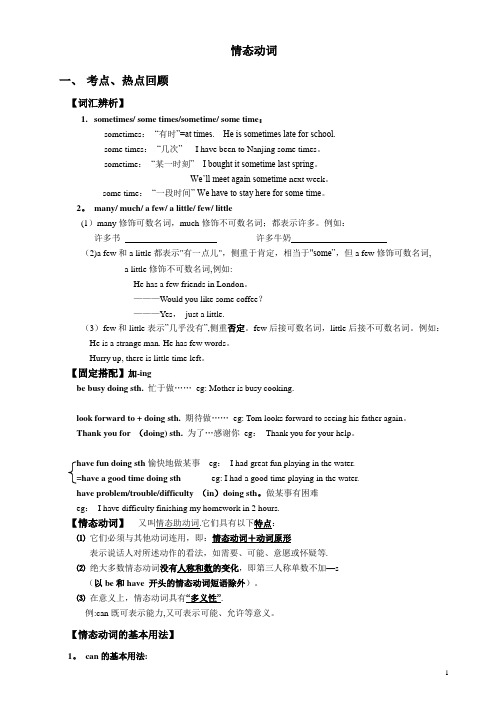
情态动词一、考点、热点回顾【词汇辨析】1.sometimes/ some times/sometime/ some time:sometimes:“有时”=at times. He is sometimes late for school.some times:“几次” I have been to Nanjing some times。
sometime:“某一时刻” I bought it sometime last spring。
We’ll meet again sometime next week。
some time:“一段时间” We have to stay here for some time。
2。
many/ much/ a few/ a little/ few/ little(1)many修饰可数名词,much修饰不可数名词;都表示许多。
例如:许多书许多牛奶(2)a few和a little都表示"有一点儿",侧重于肯定,相当于"some”,但a few修饰可数名词,a little修饰不可数名词,例如:He has a few friends in London。
———Would you like some coffee?———Yes,just a little.(3)few和little表示”几乎没有”,侧重否定。
few后接可数名词,little后接不可数名词。
例如:He is a strange man. He has few words。
Hurry up, there is little time left。
【固定搭配】加-ingbe busy doing sth.忙于做……eg: Mother is busy cooking.look forward to + doing sth. 期待做……eg: Tom looks forward to seeing his father again。
- 1、下载文档前请自行甄别文档内容的完整性,平台不提供额外的编辑、内容补充、找答案等附加服务。
- 2、"仅部分预览"的文档,不可在线预览部分如存在完整性等问题,可反馈申请退款(可完整预览的文档不适用该条件!)。
- 3、如文档侵犯您的权益,请联系客服反馈,我们会尽快为您处理(人工客服工作时间:9:00-18:30)。
情态动词一、考点、热点回忆【词汇辨析】1. sometimes/ some times/sometime/ some time:sometimes:有“时〞=at times. He is sometimes late for school.some times: 几次“〞I have been to Nanjing some times.sometime:某“一时刻〞I bought it sometime last spring.We’ ll meet again sometime next week.some time:一“段时间〞We have to stay here for some time.2. many/ much/ a few/ a little/ few/ little(1)many 修饰可数名词,much 修饰不可数名词;都表示许多。
例如:许多书许多牛奶(2)a few 和 a little 都表示 "有一点儿 " ,侧重于肯定,相当于"some" ,但 a few 修饰可数名词,a little 修饰不可数名词,例如:He has a few friends in London.---Would you like some coffee?---Yes, just a little.(3)few 和 little 表示 " 几乎没有 " ,侧重否认。
few 后接可数名词,little 后接不可数名词。
例如:He is a strange man. He has few words.Hurry up, there is little time left.【固定搭配】加-ingbe busy doing sth. 忙于做⋯⋯eg: Mother is busy cooking.look forward to + doing sth.期待做⋯⋯ eg: Tom looks forward to seeing his father again.Thank you for (doing) sth.为了⋯ 感谢你eg: Thank you for your help.have fun doing sth 愉快地做某事eg: I had great fun playing in the water.=have a good time doing sth eg: I had a good time playing in the water.have problem/trouble/difficulty (in)doing sth. 做某事有困难eg: I have difficulty finishing my homework in 2 hours.【情态动词】又叫情态助动词。
它们具有以下特点:⑴ 它们必须与其他动词连用,即:情态动词+动词原形表示说话人对所述动作的看法,如需要、可能、意愿或疑心等。
⑵绝大多数情态动词没有人称和数的变化,即第三人称单数不加-s〔以 be 和 have 开头的情态动词短语除外〕。
⑶ 在意义上,情态动词具有“多义性〞。
例: can 既可表示能力,又可表示可能、允许等意义。
【情态动词的根本用法】1.can 的根本用法:⑴表示体力或智力上的能力,即“能够,会〞,可与be able to转换。
例: He can speak English. = He is able to speak English.— Can you play basketball?— No, I can ’t.如果表示将来具备的能力,要用will be able to。
例: If I have a good sleep, I will be able to do the problem.⑵表示许可,主要用于口语,书面语一般用may。
例:—Can we go home now, please?— No, you can ’t.You can only smoke in this room.You can ’t keep the library books for more than a month.⑶表示“可能〞,与 may 同义,但一般用在疑问句中。
例: What can he possibly want?在否认句中,否认形式can’t 表示推测“不大可能〞。
例: Anybody can make mistakes.The news can ’t be true.could 使语与第一、二人称连用时,还可以就可能的解决问题的方式或可能的行为提出建议。
在这里,也可用气婉转。
例: Can / Could we meet again next week? 下周我们可以再见面吗?1— What shall we do? 我们怎么办呢?— We can / could try asking Lucy for help. ——我们可以请露茜帮助试试看。
You can / could help me with the cooking. 你可以帮我做饭。
2.may 的根本用法 :⑴表示“许可〞,用 can 比拟口语化。
例: You may / can come if you wish.如果你想来,你就来。
You may not pick flowers in this park.本公园内不许摘花。
〔 may not 表示按规定不许可,如果用mustn’t那么表示说话人不许可。
〕— May I smoke here?我可以在这里抽烟吗?— No, you mustn’t不.行。
〔 mustn ’t表示明确的制止。
〕⑵ 肯定句中表示推测,“可能〞。
例: It may rain tomorrow.明天可能会下雨。
The news may not be true.这个消息可能不会是真的。
注意:如果在疑问句中表示“可能〞,通常用can。
例: Can it be true?那会是真的吗?Who can he be?他终究是谁呢?⑶【注意】:— May I/we⋯⋯?—Yes, you may./— No, you mustn’t.3. must 的根本用法 :⑴ 表示必须,强调说话人的主观意志。
例: I must go now, or I’ll be late.You must be here by ten o’ clock.【注意】:表示“必须“时,must的否认式为needn’t,或 don’thave to ,而不是 mustn’t。
也就是:—Must I/we do it now?—Yes, you must .—No , you needn’t/don’t have to .例:—Must I go with them?— No, you.⑵表示推测,一般只用于肯定陈述句 ,表示非常肯定。
例: She didn ’t look at me. Shemust be angry.她不朝我看,一定是生气了。
He is good at English. He must know the word.他英语好,准知道这个词。
You must be Mr. Jones.想必您就是琼斯先生吧。
4. have to 的根本用法:have to 可视为情态动词,但它与其他情态动词在用法上稍有不同。
其他情态动词没有人称和数的变化,而have to却有人称和数的变化,要视主语的不同而变化。
例: I / You / We / They have to⋯.He / She / It has to ⋯.You don ’have t to ⋯.Does she have to ⋯?have to =have got to,意思是“必须,不得不〞。
和 must 不同之处: must 强调主观需要have to 强调客观需要。
例: Sorry, I have to leave now.对不起,现在我得走了。
I’ve got to go to a meeting.我得去参加一个会议。
Will he have to work deep into the night?他将不得不工作到深夜吗?5.need 的根本用法:need 的根本词义是“需要〞,它既可作情态动词,又可作实义动词。
⑴need 用作情态动词时,只用于否认句和疑问句。
它只有一种形式,后接动词原形。
例: I don ’t believe youneed worry. 我相信你没有必要焦急。
— Need we go so soon?我们需要这么早就去吗?— Yes, we must. / No, we needn’t.是的,必须。
/不,不必。
So I needn ’t tell him, need I?所以我不需要告诉他,对吧?请比拟以下两句话的不同意思:You needn ’ t buythe coat.你没有必要买那件外衣。
〔你还没买〕You needn ’ t have boughtthe coat.你没有必要买这件外衣的。
〔而你却买了〕2【注意】:— Need I/we⋯⋯?— Yes,you must ./— No , you needn’t/don’t have to .⑵need 用作实义动词时,有时态、人称和数的变化。
如果人作主语,一般后接带to 的动词不定式。
即need to do sth;如果物作主语,一般后用need to be done 或 need doing sth。
例如: I need to look up this word in the dictionary.My watch needs mending/to be mended.我的手表需要修理了。
We don ’ t needto work today. (= We needn ’t work today.)Does he need to go right now? (= Need he go right now?)6. had better 的根本用法:had bette r常略作’ d better。
现代语法认为它是一个助动词,因为它后接不带to 的动词不定式。
had better do sth 意思是“最好做某事;还是做某事比拟好〞。
例: You ’d betterget some sleep.你最好睡一会儿。
You ’ d better notdo that again.你最好别再做那件事。
What had we better do now?我们现在怎么做才好呢?Hadn’t we better tell her the truth?我们是否最好不告诉她真相?【注意】: You’d better ⋯.表示劝告或委婉的命令,对长辈不宜使用。
